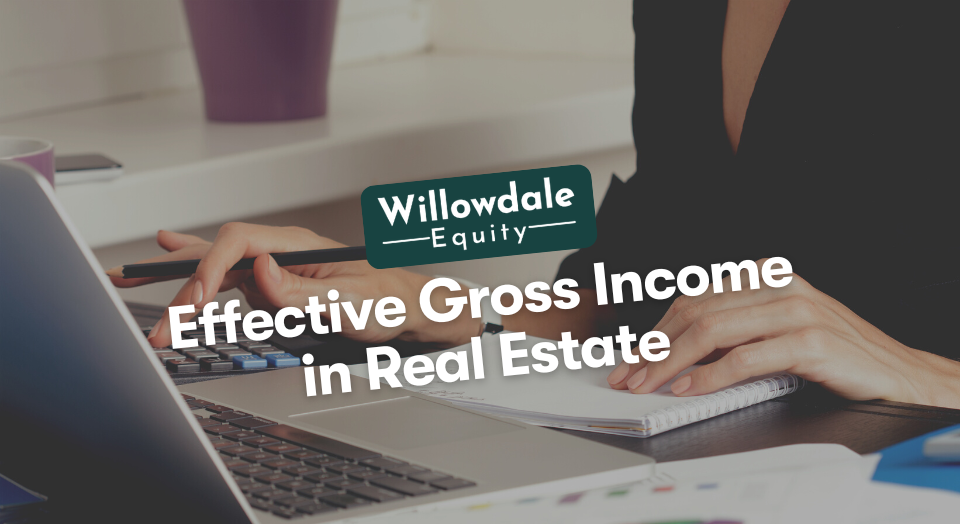
Effective Gross Income in Real Estate – What Does EGI Mean in Real Estate?
This article is part of our guide on what a good cap rate is for multifamily, available here.
There are many three-letter abbreviations to learn when investing in real estate, such as NOI and GOI. New investors may be confused by these terms and their often subtle differences. Effective gross income is no exception. Banks look at these figures when evaluating properties to determine how much money the building generates before lending.
These income-related figures also affect a property’s valuation. This article focuses on effective gross income, a vital metric considering real-world revenue conditions.
Key Takeaways
-
A property’s effective gross income is the asset’s potential gross income after deducting vacancy and bad debt.
-
Effective gross income is calculated by taking a property’s potential gross rental income and any other income it generates and subtracting its vacancies and bad debt.
-
Effective gross income and gross operating income is essentially the same. While effective gross is derived from a property’s potential revenue, gross operating income looks at the income before regular expenses.
What is Effective Gross Income? - (EGI)
A property’s effective gross income is the asset’s potential gross income after deducting vacancy and bad debt. This figure is essential when determining a property’s cash flow and valuation and gives investors an understanding of the property’s income-generation potential.
This is an important metric to understand when investing in real estate.
What does EGI mean in Real Estate?
EGI is the abbreviation of the term effective gross income. These two terms can be used interchangeably when discussing this subject. It is important to understand how this term affects real estate investments.
How to Calculate Effective Gross Income? - Effective Gross Income Formula
Effective gross income is calculated by taking a property’s potential gross rental income and any other income it generates and subtracting its vacancies and bad debt. The most common bad debt in a multifamily property is a tenant not paying their rent.
This is the primary difference between potential and effective income.
Let’s say you have a 10-unit multifamily property where each unit rent’s for $1,000. It would be easy to assume that the rental property generates $10,000 per month for its owner. However, with one apartment vacancy and another tenant behind on rent and paying only $500 a month, the property’s rental income is only $8,500.
There are two garages on the property, each being rented out for $200 per month. That income should also be considered when calculating the property’s effective gross income. In total, this property’s effective gross income is $8,900 per month or $106,800 per year.
Good Read: What is Gross Scheduled Income?
What is the Difference Between Potential Income and Effective Income?
As the terms imply, potential income is how much a property could generate, and effective income is how much it generates in real-world conditions. In a perfect world, there are no vacancies, and tenants always pay their rent. This isn’t how the real world works.
Money won’t always come in on time, and there will likely always be a way to further optimize a property’s revenue.
Effective Gross Income (EGI) vs Net Operating Income (NOI)

While effective gross income is often interchangeable with revenue, net operating income is very different. The net operating income takes the EGI and subtracts recurring operating expenses, such as utilities for the common area, accounting, and routine repairs and maintenance.
NOI doesn’t consider capital improvements such as adding new A/C units or redoing the entire complex with all new roofs.
Effective Gross Income (EGI) vs Gross Operating Income (GOI)
Effective gross income and gross operating income is essentially the same. While effective gross is derived from a property’s potential revenue, gross operating income looks at the income before regular expenses.
These are two different ways of thinking about the same figure.
Why is the Effective Gross Income (EGI) an Important Metric to Pay Close Attention to?
Effective gross income informs investors about the real-world revenue that their property generates. Often, investors will fall prey to the “flyer number” of what the property asks for in rents and the in-place occupancy number. Still, it doesn’t include the reality of delinquent tenants and unit turnover like EGI does.
EGI is also looked at when financing a property, showing a property’s effective revenue.
Frequently Asked Questions About Gross Effective Income
EGI is not the same as NOI. EGI is a property’s potential income in real-world conditions. NOI is the income generated by a property after deducting operating expenses.
Effective gross income is the same as revenue for practical purposes as it considers all income and vacancies.
Effective Gross Income - Conclusion
Now that you have a basic understanding of a property’s effective gross income, you will be able to calculate its net operating income and determine its fair market value and cap rate. You will also better understand how much a property generates and be better prepared to handle the loss of income due to vacancies and bad tenants.
If you want to network with other investors and get access to exclusive private multifamily deals, join the Willowdale Equity investor club today.
Sources:
- Investopedia, “Effective Gross Income (EGI)“
- CFI, “Effective Gross Income (EGI)“
Interested In Learning More About PASSIVE Real Estate Investing In Multifamily Properties?
Get Access to the FREE 5 Day PASSIVE Real Estate Investing Crash Course.
In this video crash course, you’ll learn everything you need to know from A to Z
about passive investing in multifamily real estate.
We’ll cover topics like earned income vs passive income, the tax advantages, why multifamily, inflation, how syndications work, and much much more!




